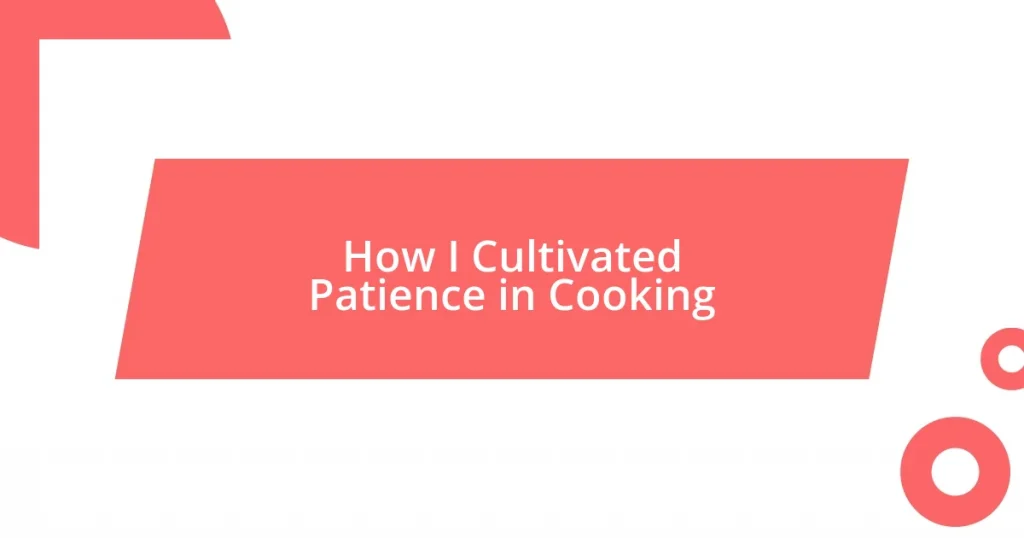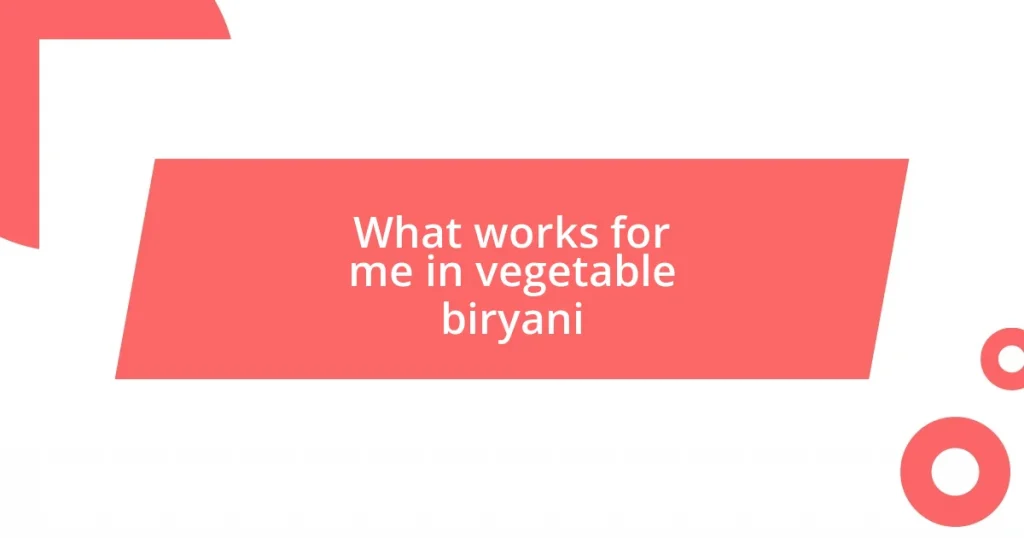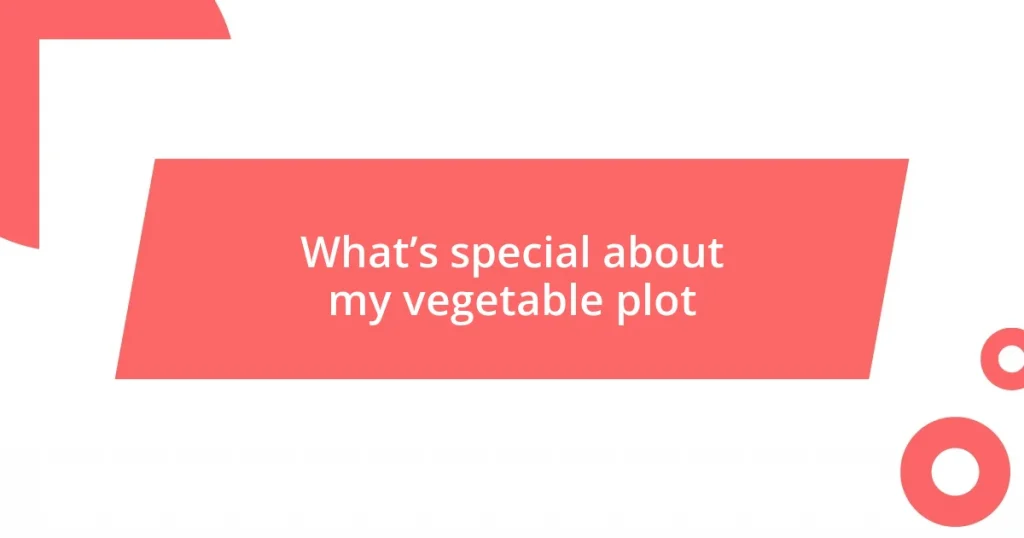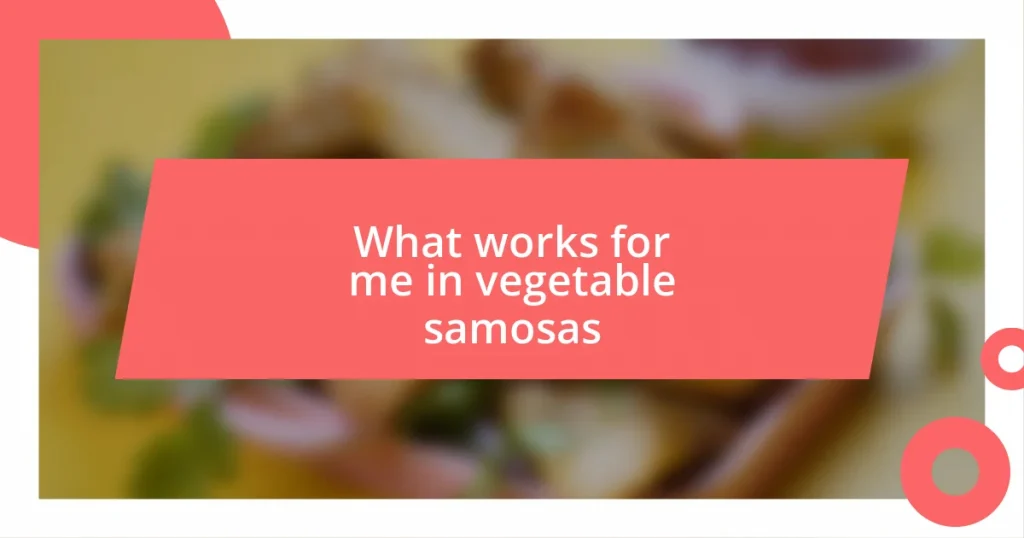Key takeaways:
- Patience in cooking enhances flavor and texture, allowing for creativity and deeper appreciation of the process.
- Adopting a cooking mindset involves mindfulness, reflection, and celebrating small victories, which leads to improved skills over time.
- Incorporating relaxation techniques and embracing mistakes as learning moments fosters a positive cooking environment and encourages growth.
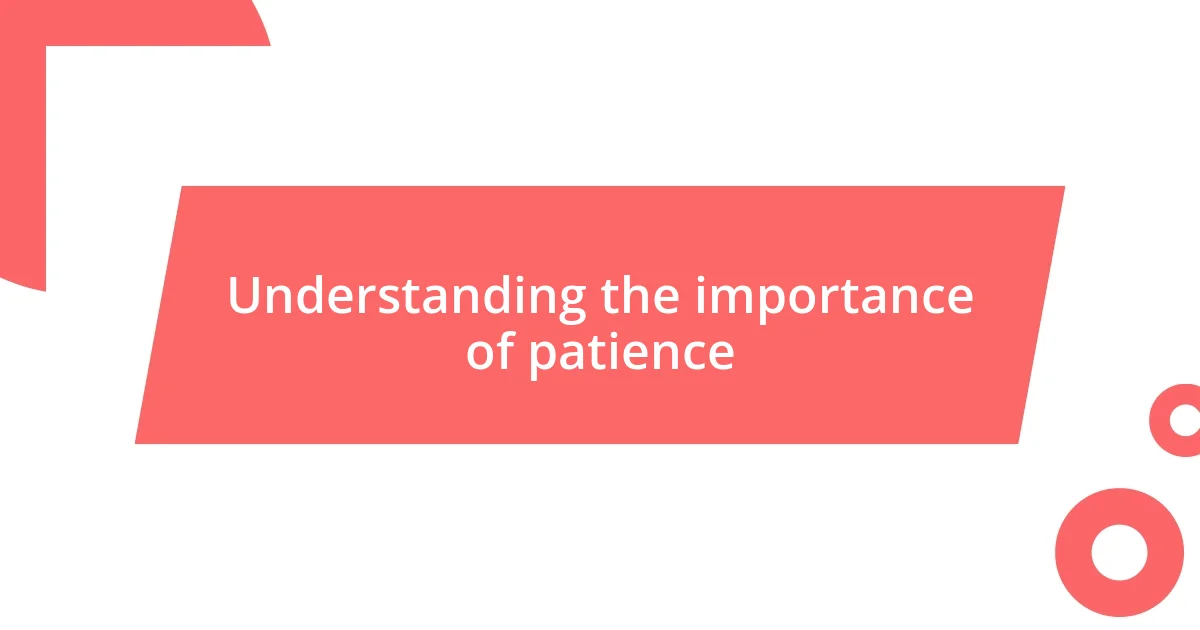
Understanding the importance of patience
Patience in cooking is not just about waiting; it’s about developing a deeper understanding of the process. I remember the first time I attempted to make homemade pasta. It was a labor-intensive journey, and I found myself frustrated as the dough refused to cooperate. But as I took the time to knead and let it rest, I began to appreciate the rhythm of cooking, realizing that every step mattered.
When I think about patience, I see it as an investment in flavor and texture. For instance, think about slow-roasting vegetables. That two-hour wait might feel excessive, but the caramelization that happens transforms those firm pieces into something magical. Isn’t it remarkable how time can change ingredients?
Moreover, patience fosters creativity in the kitchen. Sometimes, when I’m working on a recipe, I experience that urge to rush things along. Yet, I’ve learned that stepping back can lead to unexpected, delightful discoveries. Have you ever paused to let your intuition guide you after waiting? That’s when some of my best meal creations have emerged, shining with the fruits of my patience.
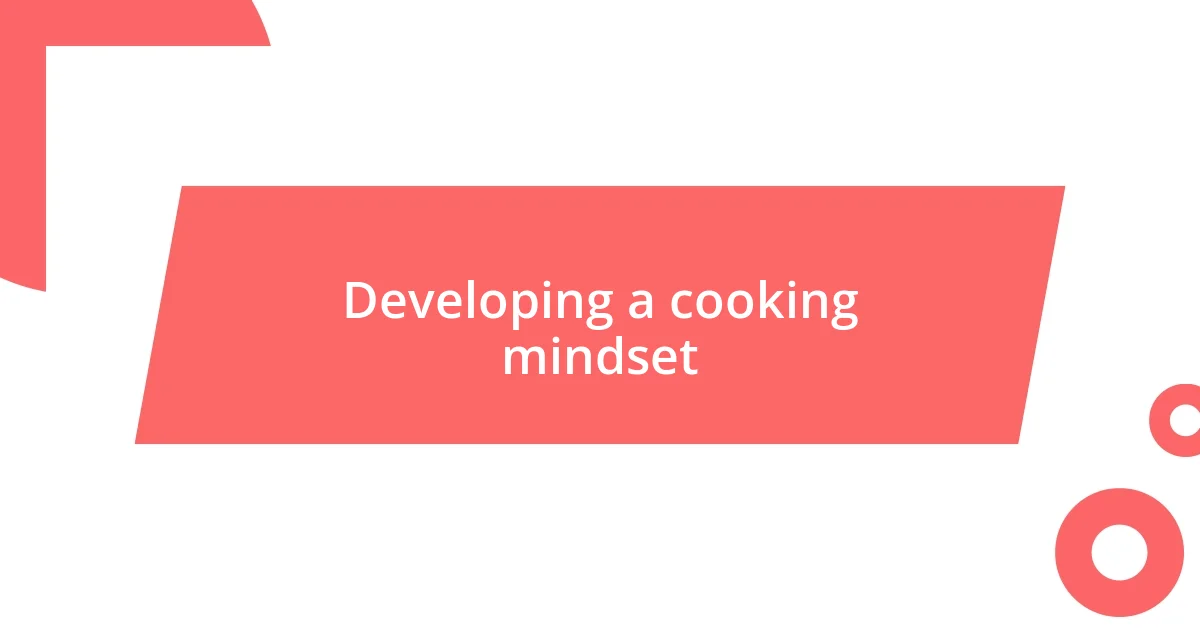
Developing a cooking mindset
Cultivating a cooking mindset begins with embracing the journey rather than fixating solely on the end result. I vividly recall a time when I was attempting to perfect a soufflé. I mixed the ingredients eagerly, but when it collapsed, I felt defeated. It was only after I learned to appreciate the delicate dance of folding the egg whites and the importance of timing that I realized cooking is as much about the process as it is about the plate that lands on the table. I had to teach myself to enjoy each moment spent in the kitchen, celebrating the little victories along the way.
To truly develop this cooking mindset, consider the following:
- Mindfulness: Focus on each step of the process. When I chop vegetables, I try to appreciate their colors and textures instead of rushing to the next phase.
- Curiosity: Approach new recipes as adventures. I often think of my kitchen as a lab where experimentation is encouraged.
- Reflection: After each cooking experience, I take a moment to think about what worked and what could improve. This shift helps me learn and grow.
- Joy of Simplicity: Sometimes, simple recipes offer the greatest satisfaction. I’ve found that a well-made omelet can evoke just as much happiness as a complicated dish.
- Flexibility: Be open to adjustments. During one dinner party, a misstep turned my intended dish into a new favorite, all because I adapted on the fly.
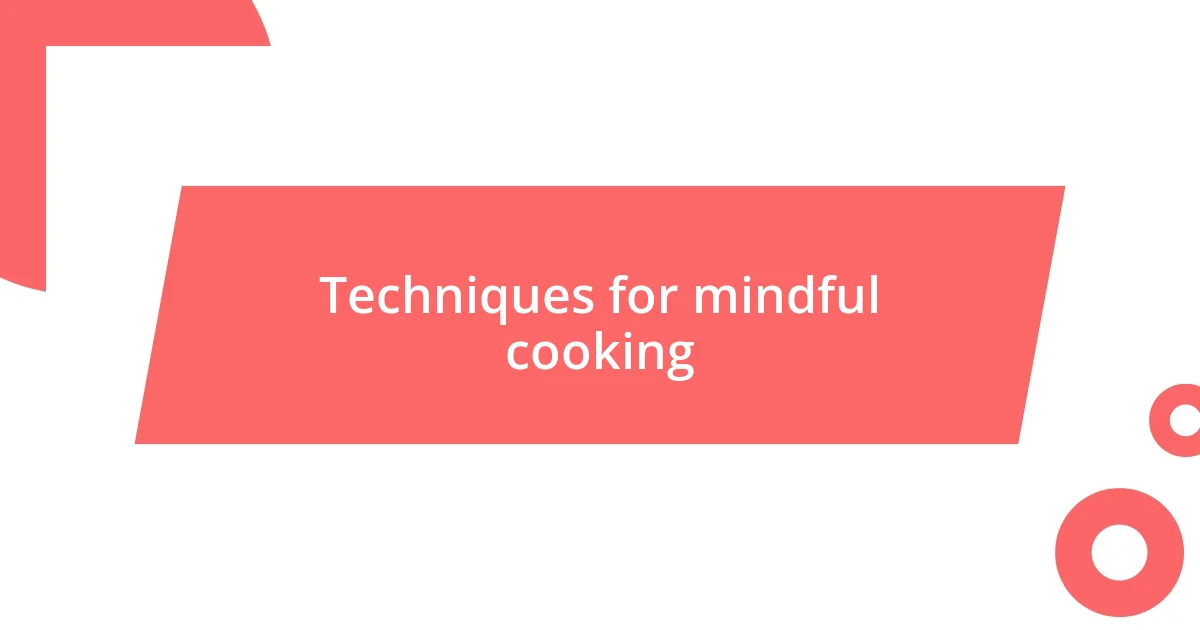
Techniques for mindful cooking
When I engage in mindful cooking, I find that the act transforms from a mere chore into an enriching experience. One technique I often use is to set intentions for my cooking session. Before I begin, I take a moment to breathe and think about what I want to achieve. I remember a day when I wanted to create a comforting soup. As I chopped each vegetable, I focused on the aromatic scents, allowing my senses to guide me and truly savor the process. It’s amazing how this simple practice can shift my mindset.
Another valuable technique revolves around pacing myself. I’ve learned to embrace the rhythm of cooking, which sometimes means stepping away from the stove for a minute. During one particularly busy dinner prep, I took a breather while the rice simmered. Those few moments of stillness provided clarity and prevented the urge to rush through. I’m always surprised at how much more invested I feel in my food when I allow myself to pause and appreciate the work I’m doing.
Incorporating sensory experiences into my cooking is another delightful approach. I often play soft music or light a candle to create a comforting atmosphere. These small additions turn cooking into a cherished routine. I recall one rainy afternoon, where I baked cookies while listening to jazz, and the whole process became a cozy ritual. Mindful cooking is not just about the food; it’s about cultivating a peaceful environment that enhances the entire experience.
| Technique | Description |
|---|---|
| Setting Intentions | Begin each cooking session by reflecting on your goals. |
| Pacing | Allow yourself breaks to prevent rushing and redouble your focus. |
| Sensory Engagement | Incorporate music or scents to create a pleasant cooking environment. |
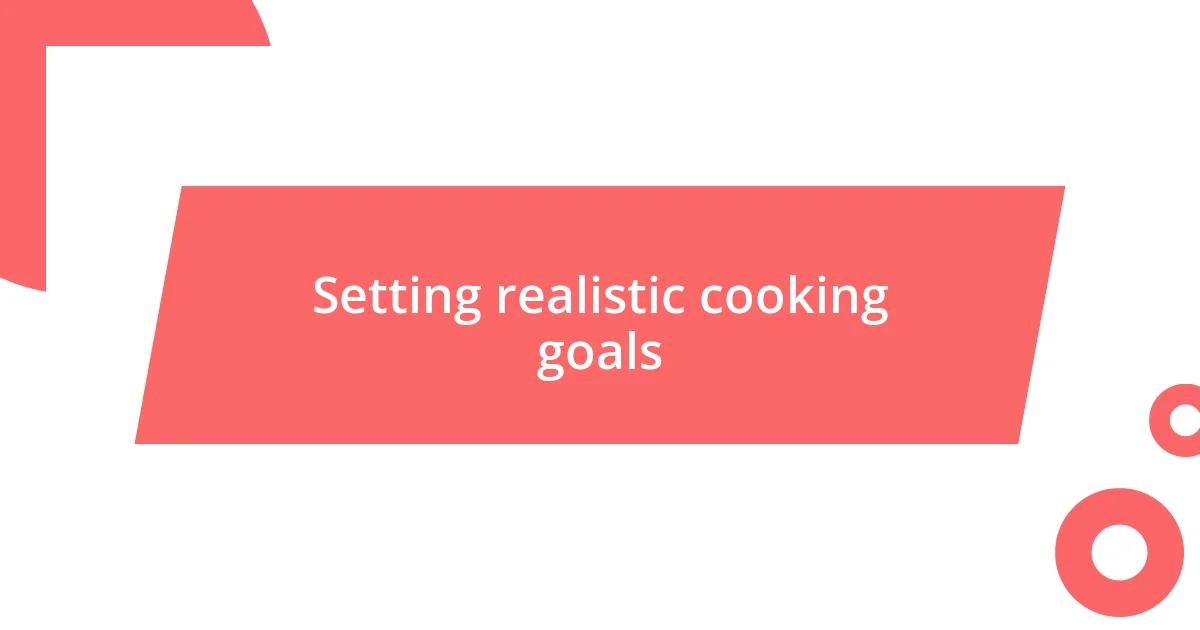
Setting realistic cooking goals
When setting realistic cooking goals, it’s essential to acknowledge where you currently stand in your cooking journey. I vividly remember my first attempt at baking bread. Instead of expecting a perfect loaf right away, I aimed for manageable targets like mastering the kneading technique. By breaking down the process into smaller, achievable goals, I not only celebrated each victory but also built the confidence to tackle more complex recipes later on.
I’ve found that adjusting my expectations based on time and my comfort level with a dish is crucial. For instance, one evening I decided to prepare a multi-course meal for friends. Initially, I had envisioned an extravagant spread; however, I quickly realized that simplicity would yield better results with my current skills. Scaling down allowed me to focus on making a delicious pasta rather than trying to juggle too many dishes. Have you ever considered how freeing it can be to simplify your plans? The relief I felt was incredibly enlightening.
Lastly, I believe it’s important to remember that cooking is a continuous learning experience. Each time I experiment in the kitchen, I gain insights that refine my future attempts. There was a time I cooked a new curry, completely overlooking an essential spice. Rather than feeling frustrated, I shifted my goal to experimenting with flavors and adjusting my recipe in real-time. This mindset not only made cooking more enjoyable but also taught me that each experience builds upon the last, setting the stage for greater culinary adventures down the road.
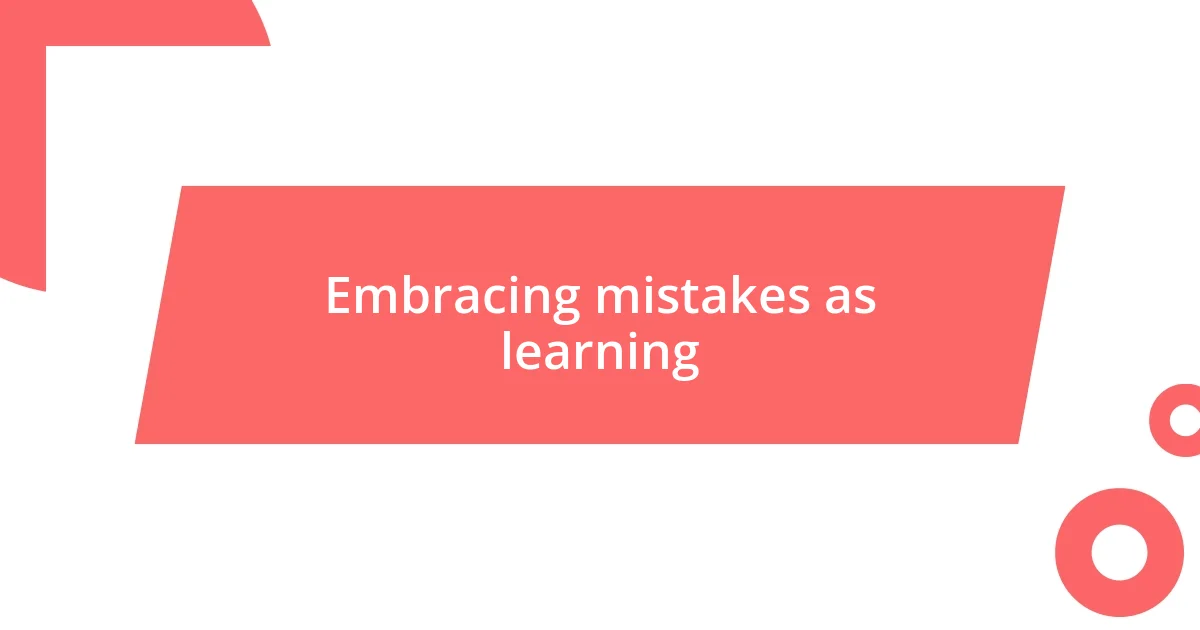
Embracing mistakes as learning
Embracing mistakes as learning moments has been a game-changer for me in the kitchen. I still recall a time when I over-salted a pasta dish— it was practically inedible. Instead of feeling defeated, I turned to my pantry and whipped up a quick sauce to balance the flavors. That mishap taught me the importance of adaptability and creativity. Isn’t it fascinating how a small error can spark a moment of inspiration?
Mistakes can often feel daunting, but I believe they are simply stepping stones toward mastery. There was one particularly ambitious baking project where my cake completely collapsed. It was disheartening to see my hard work go to waste, but I took a step back and examined what went wrong. This experience pushed me to better understand the science of baking and to read more about ingredient ratios. I learned that each failure carries a lesson waiting to be uncovered.
Looking back, I realize that my early cooking attempts were riddled with errors. Instead of shying away from them, I leaned in. I remember burning a batch of cookies and laughing at my kitchen disaster. This moment not only lightened the mood but also reinforced my belief that cooking doesn’t have to be perfect. In fact, these little blunders often lead to my most cherished recipes, proving that imperfection can lead to delicious surprises. How many of us have a story about a cooking fail that turned into a beloved dish? It’s all part of the journey.
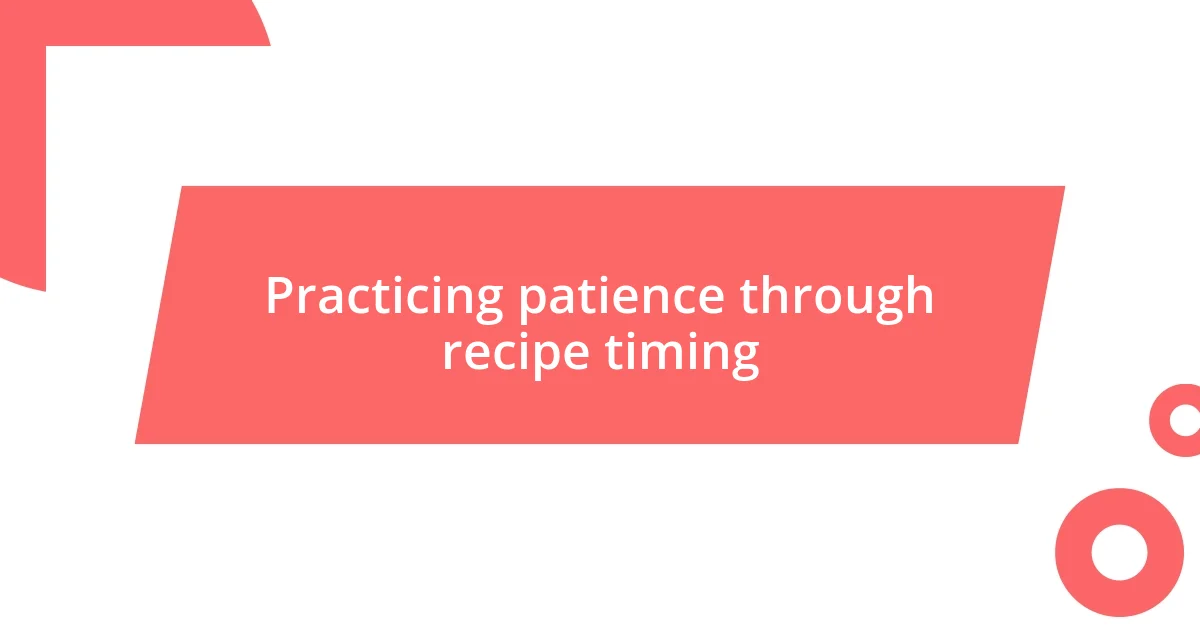
Practicing patience through recipe timing
Timing can be the heartbeat of patience in the kitchen. I remember the first time I attempted to make risotto, which requires constant stirring and gradual additions of broth. Initially, I found it maddening. I kept glancing at the clock, willing it to move faster. But as I surrendered to the process, I discovered a meditative rhythm that made the dish more enjoyable to prepare. Have you ever experienced that transformative moment where time feels less like an enemy and more like an ally?
I’ve learned that embracing the pacing of a recipe can deepen my appreciation for the food I create. For instance, when I roasted a chicken, I was tempted to crank up the oven for a quicker result. However, I decided to stick to the recommended time, allowing the flavors to meld and the skin to crisp beautifully. Waiting was challenging, but when I finally sat down to eat, the chicken was exquisite. That experience reinforced my belief that good things often come to those who wait.
One afternoon, I was making homemade pasta from scratch. The rest periods for the dough felt exasperating, yet I used that time to clean up and reflect. In those moments of stillness, I realized that cooking isn’t just about the end product; it’s about the journey and the moments spent nurturing each ingredient. I began to cherish the little pauses, understanding that they added depth to my cooking practice. Isn’t there something profoundly satisfying about savoring the waiting as part of the culinary process?
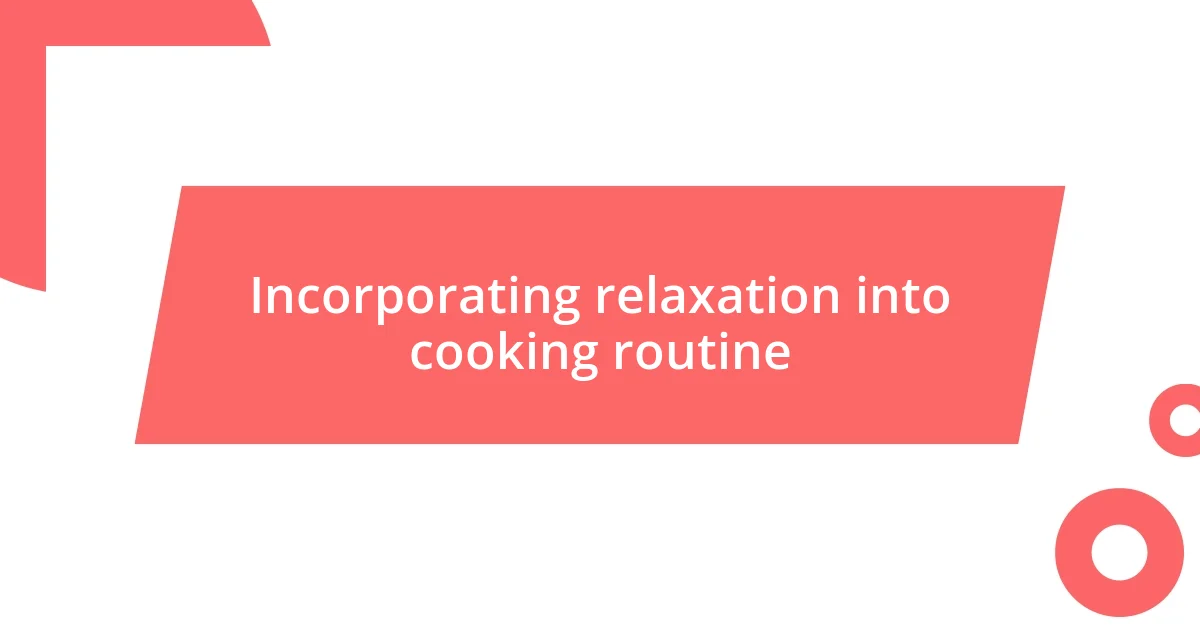
Incorporating relaxation into cooking routine
I’ve found that creating a peaceful atmosphere while cooking can significantly enhance my experience. One evening, I turned my kitchen into a relaxation zone by playing soft instrumental music and lighting a few candles. As I chopped fresh vegetables for a stir-fry, the gentle melodies wrapped around me, allowing my mind to quiet down. Have you ever noticed how setting the mood can transform a task that usually feels rushed into a soothing ritual?
During another cooking session, I made a conscious effort to breathe deeply and slow down my movements. I remember sautéing garlic and onions; instead of stirring them hurriedly, I took a moment to relish their enticing aroma as they cooked. This simple act of being present in the moment made the cooking process feel meditative. I learned that the kitchen doesn’t just reflect the hectic pace of daily life—it can also be a sanctuary for self-care if we allow it.
Incorporating relaxation techniques like stretching or deep breathing during cooking has also proven invaluable. One afternoon, while waiting for a pot to boil, I stood up and did a few gentle stretches. It was amazing how this quick break refreshed my mind and helped me focus better. When I returned to the stove, I felt more grounded and emphasized each step—not rushing but engaging fully with the cooking process. Have you ever tried a simple mindfulness technique in the kitchen? It can make a world of difference!










